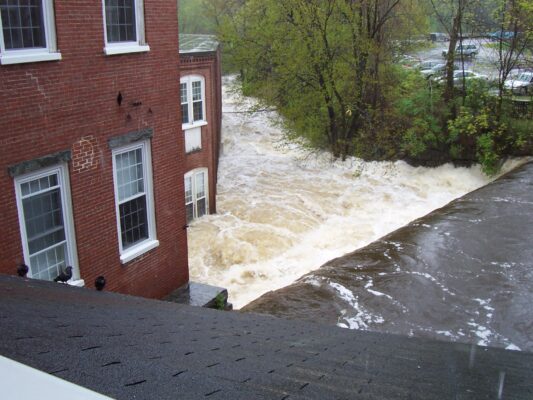No, the photos are not from Florida. They are Dover after the 2006 mother’s day 100-year flood. Here’s a preliminary look at the pending rain tax, aka stormwater utility fee. Don’t feel left out, Portsmouth and Rochester, your cities are poised to sign onto this deal, too.
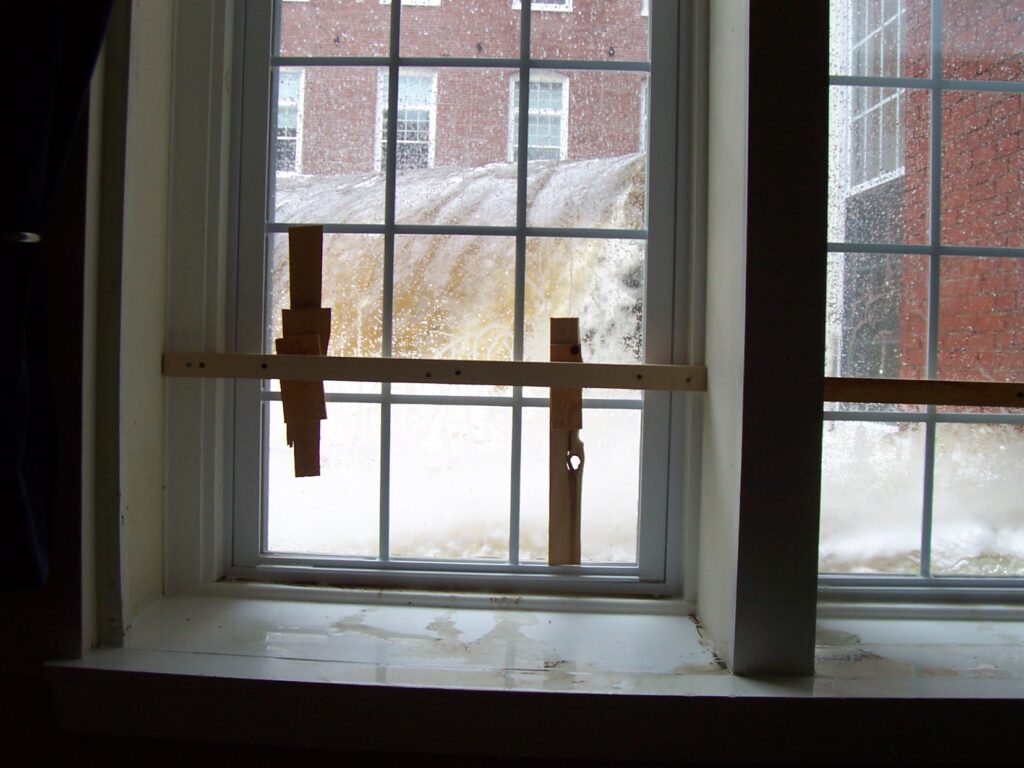
Lets walk through the highlights.
NITROGEN: nitrogen and carbon are essential to all living things. Without either one, plants don’t grow, and animals and people die. Whatever this utility or aka tax is, its not equitable or going to do squat for the environment. Besides the fact this burden will fall on an over-taxed, stressed community of renters, retired, and property owners.
1 – The deal with EPA and how the NHDES and UNH are driving the bus.
This contract, signed by the Dover city manager, is one of the most outrageous contracts to ever happen in this city. Dover would be the first in NH to pass such a tax. States where this has been implemented are faced with lawsuits, and Dover will be too.
NHDES: the trend established by NHDES clearly shows a spike in nitrogen in 2006;
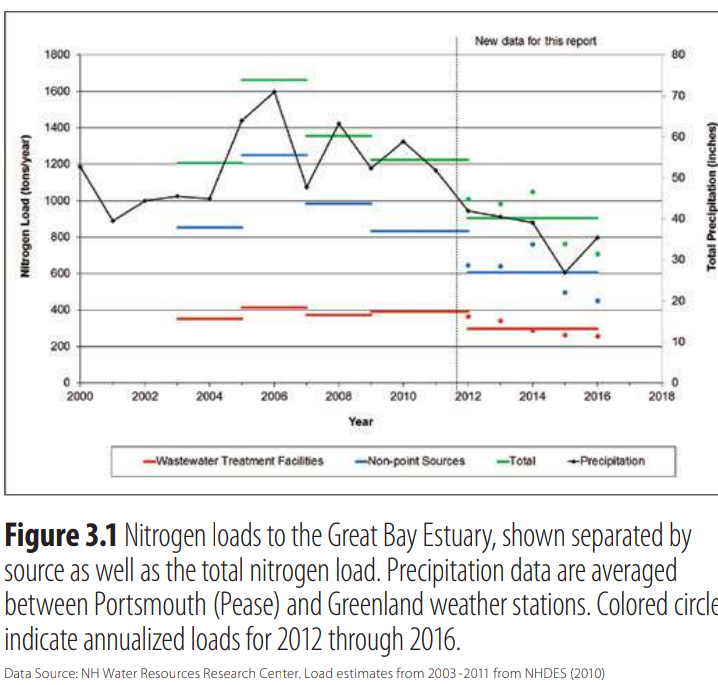
For those who were not here then, that was the mother’s day flood, aka the 100-year flood. I’ve lived here for over 50 years, three houses, and only see flooding that occurred that day one other time on Hampton beach in the 1978 blizzard due to the ocean storm surge.
I’ve attached photos of various areas of Dover that day.
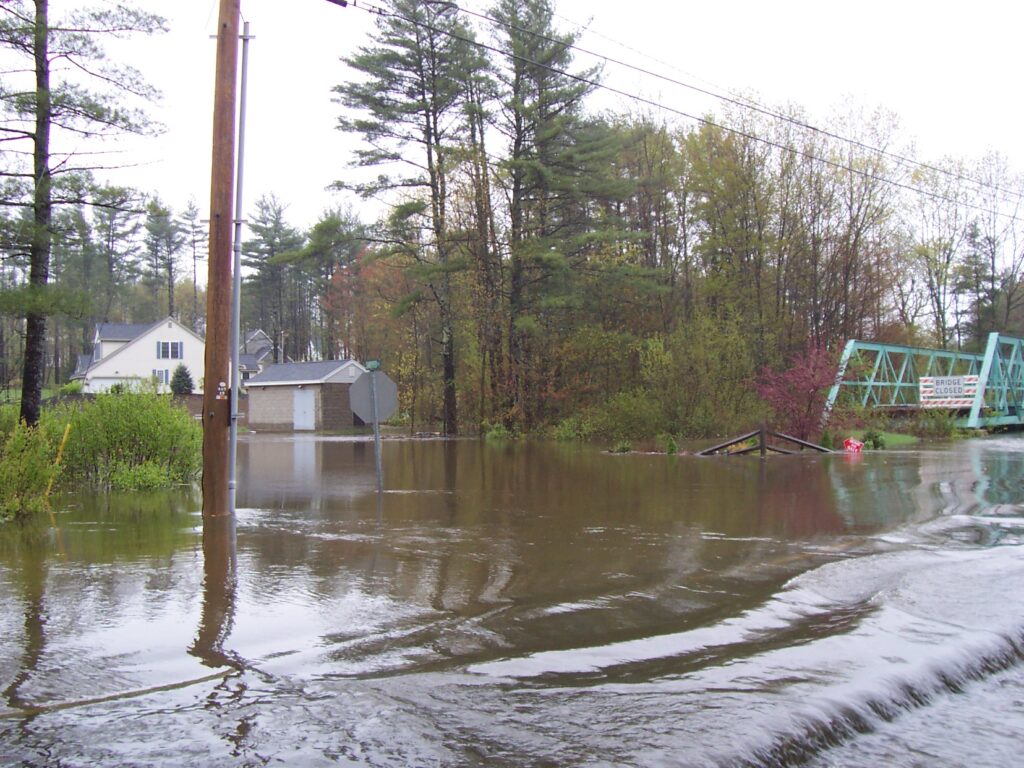
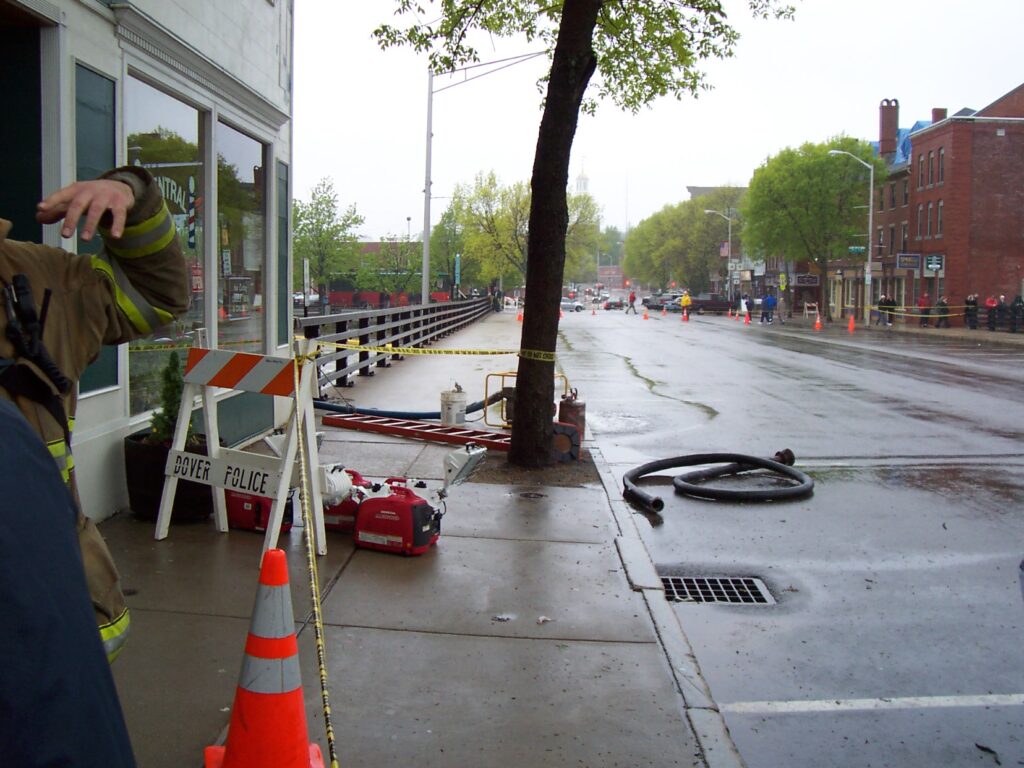
That year nitrogen in Great Bay peaked because the wastewater treatment plants along the rivers to Great Bay overflowed huge amounts of effluent and caused a spike not replicated to date. The NHDES confirmed the number one cause of nitrogen is the wastewater treatment plants, therefore confirming the 2006 data. Nitrogen levels have come down considerably since.
UNH: Here’s where it gets sketchy. According to NHDES, there’s a group of brilliant minds all gathered around computers looking at satellite images of NH. They have mapped out the entire city of Dover by map/lot and applied a number based on what images from space they acquired. Roof square footage and land, no actual field testing. For example, a farm with land in conservation and lots of pole buildings scores well over 5000 and a neighbor about 100. Not one person goes out and collects samples of runoff from anyone’s roof. Now on the other side of UNH, the land grant side, at the UNH extension service, there is another group of brilliant students where farmers, gardeners, and landscapers send soil samples every year to test the soil for growing food and other greenery, and they tell you how much nitrogen to put back into the ground!? I believe that UNH needs to gets these two groups together and discuss nitrogen and its importance for life.
2 – Actual nitrogen levels
I was curious just how much my roof, streams, and water supply is contaminated with excess nitrogen. My roof drains into a swale, as does my septic into groundwater than to a pond that neighboring 52 houses also drains into my property, then it proceeds to the Bellamy reservoir floodplain.
After a big rain storm, I tested water from my roof, 0/neutral high nitrogen. I tested the pond, 0/neurtral high nitrogen. I then tested the runoff in the Bellamy floodplain, 0/neutral high nitrogen. All are within normal limits.
I guess after reading all the EPA and NHDES materials, I thought for certain there would at least be some measurably increased nitrogen, but absolutely none! How odd? Then I checked the NHDES charts on nitrogen in Great bay and since 2006, a spike that year, they have increasingly come down a lot. Again how odd? So I ask, if it’s not a nitrogen problem, why are you implementing a tax related to nitrogen? And why runoff?
Hummm, shouldn’t the houses that flow onto my property pay me reparations?
3 – Storm water
Since equity is a buzzword today, this tax is totally inequitable and has no bearing on real science. All the material provided by the EPA is footnoted, every single projection as ASSUMPTION! Somehow the EPA has the power to stranglehold the city into a contract signed on 3/2021 to mitigate stormwater, but left out actual science that will tell us the reason for nitrogen increases which do not exist, which in fact is decreasing, in Great Bay?
Since then, the levels are down significantly, yet they want to eliminate all nitrogen anyway, you know, science. This, combined with lowered carbon, will starve all life in Great Bay, including fish, lobsters, and their food. Yet we keep on developing on the water, the city and golf courses keep on using fertilizer and pesticides, and boats continue to dump effluent into the bay. The green plan is to eliminate dirt and livestock farming.
Black Rock-backed people are working on buying farmland to make vertical farms locally in NH. This is not real food. Like fake meat, fake veggies slapped with organic labels are far from veggies. Climate change efforts are not what they appear. So when your town starts talking about stormwater utility, don’t buy it. EPA is pressuring all towns and cities in NH that have a river that flows to the ocean to sign their contract to lower nitrogen. Pretty much everyone.
4 – Harm
Let’s discuss the harm in your plan. If you plan on trapping all the stormwater and pumping it to the wastewater treatment plant, do you think of what that will do the ecosystem? Many species rely on vernal ponds that would be gone if you remove stormwater.
Legumes will be threatened. Runoff to promote algae and fish! Groundwater stores and the underground flow of water and wells. Even the city wells could be impacted. Middle school science teaches us rain falls, is absorbed, flows into rivers, or evaporates and rains again. Nothing in these documents addresses harm and are driven by data from 2006 and assumptions.
When the levels of nitrogen are too low, you will starve fish, lobsters, and other species dependent on plant life and algae.
In Idaho, they purposely burn in spring to produce nitrogen for growing. UNH extension has been advising farmers since its inception to put nitrogen into the soil to grow food. Even the US forest service has reached out to NH and NH indigenous people to start controlled burning in our state! That puts nitrogen right back into the ground and the air. It’s amazing how disconnected everyone is!!?? Especially the city of Dover.
You will, in effect, destroy farms, the hand that feeds you. Both dirt and animal farmers are stewards of the land and have been for thousands of years. They use BMPs to keep the land alive and productive. Take away nitrogen via fertilizer and runoff. You will destroy the food supply. If you want a window to the future, look at the Netherlands and the damage they are inflicting on farmers there.
What other negative impacts will this effort make? In the real world, CO2 and nitrogen are essential to life. No one in the EPA or DES actually knows 100% that any of these measures will do any good and, in fact, can do harm to the vital food supply, fragile ecosystem, and there’s absolutely no plan presented that will work and cost us money and natural resources! And what if the plan to decrease nitrogen works and fails??
5 – Why stop at roofs? Let’s discuss the many ways to eliminate nitrogen:
- All waterfront property with a lawn or driveway and no buffer pay more.
- Funeral homes, graveyards.
- Pool chemicals.
- Carwashes.
- Fire department usage fee surcharge and eliminate fire suppression chemicals that contain nitrogen.
- All fires produce nitrogen in the air and ground and should be taxed.
- Hospitals, human waste i.e., body parts, and water usage.
- Pets, wildlife, and birds that contribute to nitrates.
- Homeless people, effluent tax.
- Laundry, dishwasher flushing.
- Turnkey landfill.
- Draining pools.
- Lithium batteries must pay a fee for possible leakage and disposal, EV cars in particular.
- All towns upstream a usage fee for runoff from their towns.
- This is the shortlist.
If in fact, nitrogen is the devil, let’s discuss what can be done:
- All new development pay an impact fee, and new residence impact fee and existing residences’ septic systems should be grandfathered.
- All new septic systems have to be nitrogen-free.
- All riverfront properties pay an extra impact fee, like view tax, since they are directly impacting the waterways.
- All golf courses, lawn owners and landscape companies within a radius of 1 mile of a waterway pay an impact fee as well as stop all pesticides at once.
- A fine for stores selling fertilizers.
- Landscape companies need to be licensed according to BPMs and nitrogen free.
- City stops all use of road and lawn treatment and use non-nitrogen treatments.
- All boats, yachts etc stop dumping refuse into Great Bay and the ocean and pay a usage fee for using the rivers. We can discuss the leaking oil into the bay another time.
- Upstream towns pay an impact fee for water nitrogen that passes through Dover.
- Waste Management pay an impact usage fee for their impact.
- The State has to pony up its share for the state roads in Dover.
- All residents on septic are exempt.
- Anyone caught peeing in the woods is fined/taxed.
Many of these sound outrageous, but no more outrageous than your idea to tax roofs and driveways willy-nilly! Until you can prove, with actual science (like a nitrogen transmitter on every roof and driveway to track said nitrogen and where it ends up!), our roofs are responsible! The monumental effort to replace all septic systems per the EPA list of mitigation is ludicrous, not to mention expensive.
This city talks out of both sides of your mouth! Let’s develop the riverfront and every proposed development plan and then slap a rain tax on them. Somewhere the city lost its way with the open space efforts and allowed overdevelopment causing stress on infrastructure and wanting to punish the property owners for it.
Like the infamous “view tax,” the rain tax is completely subjective and not based on science and disguised as a fee! Legally, several precedents has been established to be unconstitutional in Ohio, Michigan, and other states, and let’s not forget the Supreme Court recently ruled the EPA does not have the authority to make laws!
Putting the horse before the cart. If you used science, you’d first ban private jets, boats, sewage raw into the water, harmful pesticides then watering lawns, actually stick to wetland setbacks and stop waterfront development, use BMPs farmers use for runoff, and all new development use nitrogen mitigation septic systems, nitrogen-free waste management, road treatment, no pool draining, all waterfront property pay more, charge upstream towns usage fee for their nitrogen in rivers and underground streams, actually mitigate Tolend landfill EPA 500 dump (this debacle is a clear view on how mismanaged the city and EPA actually are), give open space land owners city tax credit for not developing (and current use property) oh, and a few bonus items, veterans and seniors don’t pay property taxes and free parking, improve public schools scores, building moratorium until infrastructure is improved, stop pandering to special interest groups and run this city within a budget!!
6 – Closure.
So, until they can prove beyond any doubt that my property and buildings are contributing to the mysterious nonnitrogen, I will not pay a dime. The sad part about all this is they preach transparency, yet it’s an act of congress to find or learn about any of the details. Residents who are not on the internet are SOL, and even if you are, most of the data have to be requested and sent by the NHDES. We all should find this troublesome, as well as the lack of information and vague acronyms in the documents themselves! Let’s begin looking at the cities committee notes with responses and questions:
Ad Hoc committee Stormwater Recommendations.
- I’ll start with an editorial note that there are no short or long-term studies to support any of the findings and their long-term effect on the ecosystem and legumes. No data links are listed at all. Runoff does, in fact, ‘soak” into the ground. Then once the ground is saturated, it provides many useful jobs as runoff.
- The 2006 flood was a 100-year flood. There is no data that sea levels have risen beyond The opening statement of your report is void of any facts, so let’s begin. Rising seawater! In 100 years sea level has risen 3.2mm. Only speculation on it rising by inches or feet. For every glacier melted, new ice is formed. This whole report is speculative. Unless you’re punishing the residents for errors this city made in proper spending for the city’s sewer system, there is no proof we are contaminating the rivers or great bay. Runoff from a house in a cul-de-sac no one has proven it’s polluting Great Bay!
- All projections.
- We pay taxes into a general fund that is supposed to care for our sewers!
- And?
- Yes, why aren’t you using the fund to replace over the past 100 years? What have you been doing with the money if not the sewer?
- The city is the worse offender of this. The treatment plant, the road treatment, city buildings, parks, and other “lawns” that require fertilizers, the EPA 500 Tolend landfill you let drain into the cocheco for over 20 years.
- Ditto 7.
- Total BS.
- Who is the Conservation Law Foundation and why are they involved, and who is governing them?
- As it should be.
- What stormwater and food projects???
- What projects? What on this green earth are you doing?
- Of course, you need more money.
- More taxation without cause.
- Word salad.
- Here’s the beef; it’s a second tax on our square footage and an added bonus of impervious surfaces.
- Hugh?
- More details needed.
- What private sector and how much?
- Who MAAM???
- You should have been doing this for 100 years.
- Save money? Are you serious? Who mismanaged the general fund to the point you need another tax????
- Again, you are not managing what you have and allowing unbridled development to stress our infrastructure.
- What in blazes is fair about this? It is the most inequitable tax yet.
- So apparently, you are short on funding for stuff and want to bleed us some more.
- Either way, you have no right to tax something as obscure as rain! This has been argued and won.
- Why? This is absurd.
- I can just imagine the staff to do this, and it’s overstepping your city charterWhat projects? Like???
- What projects? Like???
- Again, you are barking up the wrong tree
- Here it is!
- Tell this to someone on a fixed income.
- Why is the city exempt when the worse offender???
- Seriously” Equitable credit system. What on earth? This would require a huge staff, or is that your end game? Interesting you don’t mention BMPs or farms
- if you think any of this gobblygook is understandable to anyone with an ounce of common sense? It’s not. Don’t assume we are all idiots…
- Credit system? This whole plan is nothing short of serious over-governmenting into our property. Its bad enough that our taxes are ridiculous for the services returned, but this effort is outside the city’s scope.
- So as far as I can tell, the most expensive part of this is “staff” not anything to do with science or nitrogen mitigation.
The EPA settlement agreement
https://files.cityofportsmouth.com/files/misc/MAAM-GreatBaySettlementAgreement3-25-2021.pdf
- How anyone can sign this when its all “ASSUMPTIONS” is beyond comprehension
- We already have a wastewater treatment plant, and the EPA wants another.
- This agreement is nothing but clear.
- Why are you holding non-public meetings if you want the public on board or, as you said,” public understanding and full disclosure,” right… the dates are not easy to find either…
- Where is the adaptive management plan???? No link.
- More funding
- After looking at the NHDES data, Rochester has reduced their plant 90% while Dover is maybe at 50%… why?
- After looking at the NHDES data, Rochester has reduced their plant 90% while Dover is maybe at 50%… why?
8ci. Right. This city never does any responsible development, at all…
8dii. Seriously?
8dv… You don’t know squat about agriculture or this would not be an issue
8d3. Heres more idiocy. Replace septic systems through a retrofit program. Are you seriously ok with this?
- Again, no data on low, med. And high levels all
- What project?
- You backed us into a wall on this one. EPA just lost big time with CO2, this will be next
A notable part of the EPA document is the Structural Best mg page at the bottom starts all the ‘ASSUMPTIONS”. Every single part of this is an assumption.
